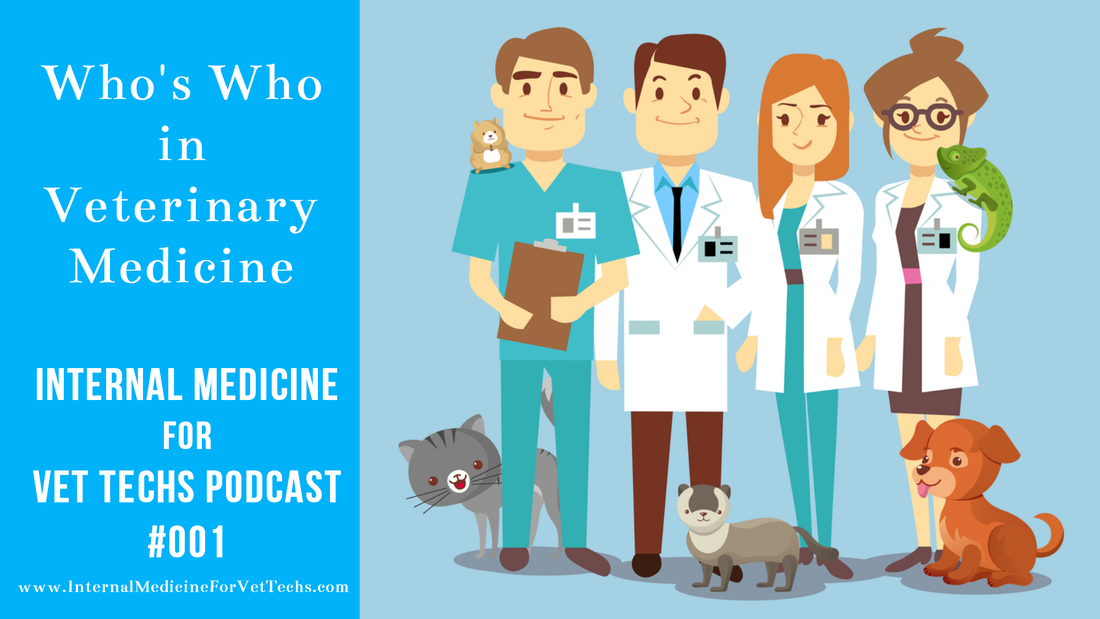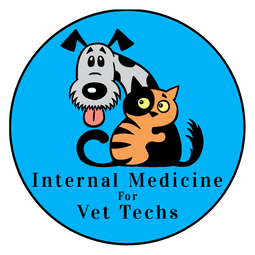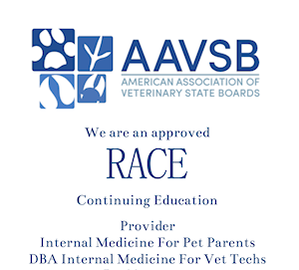
In this episode we discuss roles seen in a veterinary hospital. We also discuss credentialing for vet techs, as well as ways to further your career. We dive in little deeper into what it took for Yvonne and Jordan to get where they are.
Show Notes:
In This Episode…
Things you will learn
Credentialing for Vet Techs
Resources We Mentioned in the Show
Thanks so much for tuning in. Join us again next week for another episode! Listening Options
Thanks for listening! – Yvonne and Jordan Transcripts:001 Who's Who in Veterinary Medicine Internal Medicine For Vet Techs Podcast.mp3 transcript powered by Sonix—the best audio to text transcription service001 Who's Who in Veterinary Medicine Internal Medicine For Vet Techs Podcast.mp3 was automatically transcribed by Sonix with the latest audio-to-text algorithms. This transcript may contain errors. Sonix is the best way to convert your audio to text in 2019. Yvonne Brandenburg, RVT, VTS SAIM: Yvonne Brandenburg, RVT, VTS SAIM: Yvonne Brandenburg, RVT, VTS SAIM: Jordan Porter, RVT, LVT, VTS SAIM: Yvonne Brandenburg, RVT, VTS SAIM: Jordan Porter, RVT, LVT, VTS SAIM: Yvonne Brandenburg, RVT, VTS SAIM: Jordan Porter, RVT, LVT, VTS SAIM: Yvonne Brandenburg, RVT, VTS SAIM: Yvonne Brandenburg, RVT, VTS SAIM: Yvonne Brandenburg, RVT, VTS SAIM: Jordan Porter, RVT, LVT, VTS SAIM: Yvonne Brandenburg, RVT, VTS SAIM: Jordan Porter, RVT, LVT, VTS SAIM: Yvonne Brandenburg, RVT, VTS SAIM: Jordan Porter, RVT, LVT, VTS SAIM: Yvonne Brandenburg, RVT, VTS SAIM: Jordan Porter, RVT, LVT, VTS SAIM: Yvonne Brandenburg, RVT, VTS SAIM: Jordan Porter, RVT, LVT, VTS SAIM: Yvonne Brandenburg, RVT, VTS SAIM: Jordan Porter, RVT, LVT, VTS SAIM: Yvonne Brandenburg, RVT, VTS SAIM: Jordan Porter, RVT, LVT, VTS SAIM: Yvonne Brandenburg, RVT, VTS SAIM: Jordan Porter, RVT, LVT, VTS SAIM: Yvonne Brandenburg, RVT, VTS SAIM: Jordan Porter, RVT, LVT, VTS SAIM: Yvonne Brandenburg, RVT, VTS SAIM: Jordan Porter, RVT, LVT, VTS SAIM: Yvonne Brandenburg, RVT, VTS SAIM: Jordan Porter, RVT, LVT, VTS SAIM: Yvonne Brandenburg, RVT, VTS SAIM: Jordan Porter, RVT, LVT, VTS SAIM: Yvonne Brandenburg, RVT, VTS SAIM: Jordan Porter, RVT, LVT, VTS SAIM: Yvonne Brandenburg, RVT, VTS SAIM: Jordan Porter, RVT, LVT, VTS SAIM: Yvonne Brandenburg, RVT, VTS SAIM: Jordan Porter, RVT, LVT, VTS SAIM: Yvonne Brandenburg, RVT, VTS SAIM: Jordan Porter, RVT, LVT, VTS SAIM: Yvonne Brandenburg, RVT, VTS SAIM: Yvonne Brandenburg, RVT, VTS SAIM: Jordan Porter, RVT, LVT, VTS SAIM: Yvonne Brandenburg, RVT, VTS SAIM: Jordan Porter, RVT, LVT, VTS SAIM: Yvonne Brandenburg, RVT, VTS SAIM: Jordan Porter, RVT, LVT, VTS SAIM: Yvonne Brandenburg, RVT, VTS SAIM: Definitely. Because I mean being in the front office makes or breaks your day just based on like how clients handle situations, how your front office staff handles situations. It's stressful, you know. Yvonne Brandenburg, RVT, VTS SAIM: Jordan Porter, RVT, LVT, VTS SAIM: Yvonne Brandenburg, RVT, VTS SAIM: Jordan Porter, RVT, LVT, VTS SAIM: Yvonne Brandenburg, RVT, VTS SAIM: Jordan Porter, RVT, LVT, VTS SAIM: Yvonne Brandenburg, RVT, VTS SAIM: Jordan Porter, RVT, LVT, VTS SAIM: Yvonne Brandenburg, RVT, VTS SAIM: Jordan Porter, RVT, LVT, VTS SAIM: Yvonne Brandenburg, RVT, VTS SAIM: Jordan Porter, RVT, LVT, VTS SAIM: Yvonne Brandenburg, RVT, VTS SAIM: Yvonne Brandenburg, RVT, VTS SAIM: Jordan Porter, RVT, LVT, VTS SAIM: Yvonne Brandenburg, RVT, VTS SAIM: Jordan Porter, RVT, LVT, VTS SAIM: Yvonne Brandenburg, RVT, VTS SAIM: Jordan Porter, RVT, LVT, VTS SAIM: Jordan Porter, RVT, LVT, VTS SAIM: Yvonne Brandenburg, RVT, VTS SAIM: Jordan Porter, RVT, LVT, VTS SAIM: Yvonne Brandenburg, RVT, VTS SAIM: Jordan Porter, RVT, LVT, VTS SAIM: Yvonne Brandenburg, RVT, VTS SAIM: Jordan Porter, RVT, LVT, VTS SAIM: Yvonne Brandenburg, RVT, VTS SAIM: Jordan Porter, RVT, LVT, VTS SAIM: Yvonne Brandenburg, RVT, VTS SAIM: Jordan Porter, RVT, LVT, VTS SAIM: Yvonne Brandenburg, RVT, VTS SAIM: Jordan Porter, RVT, LVT, VTS SAIM: Yvonne Brandenburg, RVT, VTS SAIM: Jordan Porter, RVT, LVT, VTS SAIM: Yvonne Brandenburg, RVT, VTS SAIM: Jordan Porter, RVT, LVT, VTS SAIM: Yvonne Brandenburg, RVT, VTS SAIM: Jordan Porter, RVT, LVT, VTS SAIM: Yvonne Brandenburg, RVT, VTS SAIM: Jordan Porter, RVT, LVT, VTS SAIM: Yvonne Brandenburg, RVT, VTS SAIM: Jordan Porter, RVT, LVT, VTS SAIM: Yvonne Brandenburg, RVT, VTS SAIM: Jordan Porter, RVT, LVT, VTS SAIM: Yvonne Brandenburg, RVT, VTS SAIM: Jordan Porter, RVT, LVT, VTS SAIM: Yvonne Brandenburg, RVT, VTS SAIM: Jordan Porter, RVT, LVT, VTS SAIM: Yvonne Brandenburg, RVT, VTS SAIM: Jordan Porter, RVT, LVT, VTS SAIM: Yvonne Brandenburg, RVT, VTS SAIM: Jordan Porter, RVT, LVT, VTS SAIM: Yvonne Brandenburg, RVT, VTS SAIM: Jordan Porter, RVT, LVT, VTS SAIM: Yvonne Brandenburg, RVT, VTS SAIM: Jordan Porter, RVT, LVT, VTS SAIM: Yvonne Brandenburg, RVT, VTS SAIM: Jordan Porter, RVT, LVT, VTS SAIM: Yvonne Brandenburg, RVT, VTS SAIM: Jordan Porter, RVT, LVT, VTS SAIM: Yvonne Brandenburg, RVT, VTS SAIM: Jordan Porter, RVT, LVT, VTS SAIM: Yvonne Brandenburg, RVT, VTS SAIM: Jordan Porter, RVT, LVT, VTS SAIM: Yvonne Brandenburg, RVT, VTS SAIM: Jordan Porter, RVT, LVT, VTS SAIM: Yvonne Brandenburg, RVT, VTS SAIM: Jordan Porter, RVT, LVT, VTS SAIM: Yvonne Brandenburg, RVT, VTS SAIM: Jordan Porter, RVT, LVT, VTS SAIM: Yvonne Brandenburg, RVT, VTS SAIM: Jordan Porter, RVT, LVT, VTS SAIM: Yvonne Brandenburg, RVT, VTS SAIM: Jordan Porter, RVT, LVT, VTS SAIM: Yvonne Brandenburg, RVT, VTS SAIM: Jordan Porter, RVT, LVT, VTS SAIM: Yvonne Brandenburg, RVT, VTS SAIM: Jordan Porter, RVT, LVT, VTS SAIM: Yvonne Brandenburg, RVT, VTS SAIM: Jordan Porter, RVT, LVT, VTS SAIM: Yvonne Brandenburg, RVT, VTS SAIM: Jordan Porter, RVT, LVT, VTS SAIM: Yvonne Brandenburg, RVT, VTS SAIM: Jordan Porter, RVT, LVT, VTS SAIM: Yvonne Brandenburg, RVT, VTS SAIM: Jordan Porter, RVT, LVT, VTS SAIM: Yvonne Brandenburg, RVT, VTS SAIM: Jordan Porter, RVT, LVT, VTS SAIM: Yvonne Brandenburg, RVT, VTS SAIM: Jordan Porter, RVT, LVT, VTS SAIM: Yvonne Brandenburg, RVT, VTS SAIM: Jordan Porter, RVT, LVT, VTS SAIM: Yeah. We both took it and it helped us tremendously with getting our specialty license. And then, you know, consider moving up in the field whether that's, you know, going to management because you love that. Or maybe you're gonna run the social media for your hospital, which is huge. You know, that helps get the word out about your clinic specializing. So there's again, there's 16 different specialties and there are definitely some that you can do within your practice. Even if you're just a general practice, and "just" being, you know, it's not really "just", but even if you are a general practice and not a specialty hospital, you can still specialize and up your skills and up your game. So just remember, that's an option. Any other tips that you want in that field? Jordan Porter, RVT, LVT, VTS SAIM: Jordan Porter, RVT, LVT, VTS SAIM: Yvonne Brandenburg, RVT, VTS SAIM: Jordan Porter, RVT, LVT, VTS SAIM: Yvonne Brandenburg, RVT, VTS SAIM: Jordan Porter, RVT, LVT, VTS SAIM: Yvonne Brandenburg, RVT, VTS SAIM: Jordan Porter, RVT, LVT, VTS SAIM: Yvonne Brandenburg, RVT, VTS SAIM: Jordan Porter, RVT, LVT, VTS SAIM: Yvonne Brandenburg, RVT, VTS SAIM: Jordan Porter, RVT, LVT, VTS SAIM: Wow. Jordan Porter, RVT, LVT, VTS SAIM: Yvonne Brandenburg, RVT, VTS SAIM: Jordan Porter, RVT, LVT, VTS SAIM: Yvonne Brandenburg, RVT, VTS SAIM: Jordan Porter, RVT, LVT, VTS SAIM: Yvonne Brandenburg, RVT, VTS SAIM: Jordan Porter, RVT, LVT, VTS SAIM: Yvonne Brandenburg, RVT, VTS SAIM: Jordan Porter, RVT, LVT, VTS SAIM: Yvonne Brandenburg, RVT, VTS SAIM: Jordan Porter, RVT, LVT, VTS SAIM: Yvonne Brandenburg, RVT, VTS SAIM: Jordan Porter, RVT, LVT, VTS SAIM: Yvonne Brandenburg, RVT, VTS SAIM: Jordan Porter, RVT, LVT, VTS SAIM: Yvonne Brandenburg, RVT, VTS SAIM: Jordan Porter, RVT, LVT, VTS SAIM: Yvonne Brandenburg, RVT, VTS SAIM: Jordan Porter, RVT, LVT, VTS SAIM: Yvonne Brandenburg, RVT, VTS SAIM: Jordan Porter, RVT, LVT, VTS SAIM: You know, we'll dive into that, think in depth at some point, too. And then the last thing that I'm sure is a big subject and we can't kind of all know that is mental health in our field because of compassion fatigue or ethical fatigue. I'm kind of depending on, you know, what what's going on. But we all go through it because of just the nature of the things that we see day in, day out. Jordan Porter, RVT, LVT, VTS SAIM: Yvonne Brandenburg, RVT, VTS SAIM: Jordan Porter, RVT, LVT, VTS SAIM: Yvonne Brandenburg, RVT, VTS SAIM: Jordan Porter, RVT, LVT, VTS SAIM: Yvonne Brandenburg, RVT, VTS SAIM: Jordan Porter, RVT, LVT, VTS SAIM: Yvonne Brandenburg, RVT, VTS SAIM: Jordan Porter, RVT, LVT, VTS SAIM: Yvonne Brandenburg, RVT, VTS SAIM: Yvonne Brandenburg, RVT, VTS SAIM: Quickly and accurately convert audio to text with Sonix.Sonix uses cutting-edge artificial intelligence to convert your mp3 files to text. Thousands of researchers and podcasters use Sonix to automatically transcribe their audio files (*.mp3). Easily convert your mp3 file to text or docx to make your media content more accessible to listeners. Sonix is the best online audio transcription software in 2019—it's fast, easy, and affordable.If you are looking for a great way to convert your mp3 to text, try Sonix today. Continuing Education Certificate
Want to earn some RACE approved CE credits for listening to the podcast? You can earn between 0.5-1.0 hour of RACE approved CE credit for each podcast episode you listen to.
Join the Internal Medicine For Vet Techs Membership to earn and keep track of your continuing education hours as you get your learn on! Join now! http://internalmedicineforvettechsmembership.com/ Question of the Week:
What’s your position/job title and where do you want to go? And, what are you willing to do to get there? Where are you located? What made you decide to work in veterinary medicine/ tell us about yourself?
Leave a comment below!
8 Comments
Cait
10/15/2019 08:41:13 am
Hello! My name is Cait, I'm an LVT at Michigan State University in the Small Animal Internal Medicine department. I never thought I'd end up in SAIM but I'm enjoying and planning to get my VTS. I chose Vet Med because both my parents are in human med so I've always been comfortable with the medical field but like animals so much more than people.
Reply
10/15/2019 11:27:22 am
Hi Cait!
Reply
Corinne Maldonado
1/8/2020 10:02:33 am
:) This was a lot of fun! Looking forward to listening to the rest!
Reply
Jordan Porter RVT, LVT, VTS (SAIM)
1/9/2020 07:34:58 am
Thank you for your comment! And thank you for listening. Please let us know if you want to hear something specific.
Reply
Morgan
1/25/2020 09:52:46 pm
Hi my name is Morgan and I am currently working as a vet tech in Utah. As you stated in your show notes Utah does not require credentialing. I do work with a few vet techs that are licensed in other states and work here. I was just wondering what your advice would be if I were to get licensed what state should I go through because the state I'm currently working in doesn't require it?
Reply
Jordan Porter RVT, LVT, VTS (SAIM)
1/27/2020 02:02:05 pm
Thank you so much for commenting Morgan!!! That is great that even though you do not work in a state that requires credentials you still want to pursue! As for your question... I am not sure; however, I am happy to try to assist. Are you ok if I ask your question in the podcast group? I know there are a few techs in there who were in a similar situation and I think they may be able to assist.
Reply
Andrea
9/11/2023 08:42:10 pm
Hi Y
Reply
Andrea
9/11/2023 08:45:55 pm
Hi Yvonne and Jordan!! My name is Andrea and im a RVT in California. I just started listening to your guys podcast, I really enjoy the topics and how relatable they are. You guys are awesome!! Keep doing what you guys are doing!! I look forward to listening future episodes. <3
Reply
Leave a Reply. |
Looking for a specific topic? Search below to get the right episode!
Sign Up for your password for the Technician Treasure Trove! Where to ListenArchives
June 2024
Categories
All
|
Visit www.InternalMedicineForPetParents.com to learn more about us
 RSS Feed
RSS Feed

